
EUROPEAN JOURNAL OF INFORMATION SYSTEMS
Scope & Guideline
Pioneering Insights for a Digital Tomorrow
Introduction
Aims and Scopes
- Information Technology and Business Alignment:
Research on how organizations can align their IT strategy with business objectives to enhance performance and competitive advantage. - Digital Transformation:
Exploration of how organizations adapt to digital technologies and the implications for operational and strategic outcomes. - Human-Computer Interaction and User Experience:
Studies focusing on the interaction between users and information systems, emphasizing usability, user engagement, and the design of intuitive interfaces. - Artificial Intelligence in Information Systems:
Examination of the integration of AI technologies in information systems and their impact on decision-making, efficiency, and innovation. - Cybersecurity and Information Privacy:
Research addressing the challenges of cybersecurity, data protection, and user privacy in the digital landscape. - Gamification and Engagement:
Investigation of gamification strategies in various contexts, including their effectiveness in enhancing user engagement and learning outcomes. - Sociotechnical Systems:
Analysis of the interplay between social and technical factors in the design and implementation of information systems. - Emerging Technologies and Innovation:
Studies on the impact of new technologies (e.g., blockchain, IoT) on business models, processes, and organizational structures.
Trending and Emerging
- AI and Machine Learning Applications:
There is a marked increase in research exploring how AI and machine learning can be applied to improve decision-making processes and operational efficiencies within organizations. - Sustainability and Ethical Considerations:
A growing emphasis on sustainability in technology use and ethical considerations in AI and data management reflects a shift towards responsible information systems. - User-Centric Design and Experience:
Emerging focus on user experience design and user engagement strategies indicates a trend towards creating more intuitive and user-friendly information systems. - Remote Work and Digital Collaboration:
Research examining the impacts of remote work and digital collaboration tools is rising, especially in the context of the COVID-19 pandemic. - Cybersecurity Resilience:
Increasing attention on building resilience against cybersecurity threats demonstrates a shift towards proactive and adaptive security measures. - Data Analytics and Business Intelligence:
There is an emerging trend towards leveraging big data analytics and business intelligence tools to drive strategic decisions and innovation. - Interdisciplinary Approaches to Information Systems:
A notable trend in integrating insights from various disciplines such as sociology, psychology, and economics into information systems research.
Declining or Waning
- Traditional IT Project Management:
Research on conventional project management methodologies appears to be declining as agile and adaptive approaches gain more attention. - Purely Technical Focus:
Studies that focus solely on technical aspects of information systems without considering social implications or user experiences are becoming less prevalent. - Static Information Systems Models:
The use of static models to describe information systems is waning, as dynamic and context-aware frameworks gain traction. - Regulatory Compliance in IS:
Research focusing solely on compliance with regulations is decreasing as organizations are now prioritizing strategic alignment and innovation. - Single-Disciplinary Studies:
Papers that do not draw upon interdisciplinary perspectives are less common, as the integration of diverse fields becomes increasingly important.
Similar Journals

Australasian Journal of Information Systems
Elevating Discourse in Technology and Society.The Australasian Journal of Information Systems (AJIS), published by the University of Canberra’s Faculty of Information Sciences & Engineering, is a leading open-access journal that has been fostering scholarly communication in the realms of information systems and technology since its inception in 1993. With an ISSN of 1449-8618 and E-ISSN 1326-2238, the journal is headquartered in Australia and provides a platform for innovative research and thought leadership in key areas such as business management, human-computer interaction, and information systems management. Recognized for its quality and impact, AJIS boasts a commendable Q2 ranking in several categories including Information Systems, reflecting its relevance and significance in the academic community. Researchers, professionals, and students alike will find this journal not only instrumental for advancing their knowledge but also essential for engaging with contemporary issues and trends in information sciences. With a commitment to open access, AJIS ensures that high-quality research is widely accessible, fostering collaboration and discourse across international boundaries.
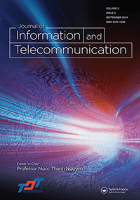
Journal of Information and Telecommunication
Unleashing Insights in Telecommunications and Information Technology.Journal of Information and Telecommunication, published by TAYLOR & FRANCIS LTD, is a distinguished open access journal that has been enhancing the global discourse since its establishment in 2017. With an ISSN of 2475-1839 and an E-ISSN of 2475-1847, this journal is located in the United Kingdom and dedicates its focus to the fields of information technology, telecommunications, and related disciplines. Boasting a respectable Q2 quartile ranking across various categories including Computer Networks and Communications, Electrical and Electronic Engineering, and Computer Science Applications in 2023, it ranks notably in the top percentiles of scopus rankings, asserting its significance in the academic community. The journal's commitment to open access since its inception has fostered widespread accessibility, encouraging research dissemination and collaboration on a global scale. By providing a platform for high-quality research, it aims to unite researchers, professionals, and students in their pursuit of innovation and excellence in the ever-evolving digital landscape.
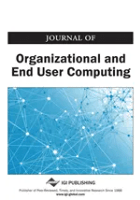
Journal of Organizational and End User Computing
Pioneering Research in User Interfaces and Organizational PracticesThe Journal of Organizational and End User Computing, published by IGI Global, is a leading peer-reviewed outlet dedicated to exploring the intersection of organizational practices and user interfaces within the digital realm. With a robust ISSN of 1546-2234 and an E-ISSN of 1546-5012, the journal has established itself as a crucial resource for scholars and practitioners in the fields of Computer Science Applications, Human-Computer Interaction, and Strategy and Management. Recognized for its quality, the journal attained Q3 status in Computer Science Applications and Human-Computer Interaction, and Q2 status in Strategy and Management in 2023, reflecting its esteemed position in academic rankings. Operating from the heart of the United States, the journal has converged its focus from 2004 to 2024, making it a reliable source for cutting-edge research and industry trends. Although it does not offer open access, the Journal of Organizational and End User Computing remains an invaluable repository of knowledge, perfect for researchers, professionals, and students seeking to advance their understanding of organizational structures and user engagement in computing environments.

IADIS-International Journal on Computer Science and Information Systems
Empowering Scholars in the World of Information SystemsIADIS-International Journal on Computer Science and Information Systems is a prominent platform dedicated to advancing research and knowledge in the field of computer science and information systems. Published by IADIS, this journal aims to disseminate innovative findings and theoretical advancements that address contemporary challenges and trends in technology. The journal fosters a rigorous peer-review process, ensuring that only high-quality research is shared with its audience, which includes researchers, professionals, and students from around the globe. Although the journal is not currently open access, it serves as a vital resource for those looking to deepen their understanding of the evolving landscape of computer science. The ISSN of this journal is 1646-3692, and it boasts a strong commitment to promoting interdisciplinary communication and collaboration in the realm of information technology, making it an essential read for anyone looking to stay at the forefront of this fast-paced field.
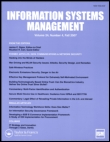
INFORMATION SYSTEMS MANAGEMENT
Advancing the Frontiers of Information Systems KnowledgeINFORMATION SYSTEMS MANAGEMENT is a premier academic journal published by Taylor & Francis Inc, focusing on the ever-evolving fields of Information Systems, Computer Science Applications, and Library and Information Sciences. With an impressive track record spanning over three decades since its inception in 1992, this journal is recognized in the top quartile (Q1) of its categories as of 2023, reflecting its influence and contribution to the research community. The journal holds commendable rankings in Scopus, positioned at #6 out of 280 in Library and Information Sciences, #44 out of 817 in Computer Science Applications, and #23 out of 394 in Information Systems, all showcasing its esteemed standing among peers. While the journal is not open access, it remains a vital resource for researchers, professionals, and students seeking to enhance their understanding of information systems management through high-quality, peer-reviewed articles that illuminate current trends, innovative technologies, and theoretical advancements in the field. With its dedicated commitment to scholarly excellence, INFORMATION SYSTEMS MANAGEMENT continues to be a leading platform for fostering knowledge dissemination and promoting academic dialogue.
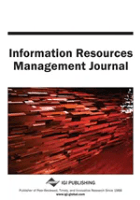
Information Resources Management Journal
Illuminating Pathways in Information Resource Management.Information Resources Management Journal, published by IGI Global, is a pivotal academic resource dedicated to the exploration of innovations and best practices in the realms of information management, library sciences, and strategic management. First established in 1988, this journal has continually evolved, providing researchers and practitioners with essential insights that shape the industry. With an impressive Scopus ranking positioning it within the 75th percentile in Library and Information Sciences, and its notable presence in Business and International Management, it garners attention from a diverse audience keen on navigating the complexities of managing information resources effectively. Although it currently does not offer open access options, the journal remains committed to disseminating impactful research that resonates with scholars and industry professionals alike. As it approaches its convergence year of 2024, Information Resources Management Journal stands as a cornerstone for those aspiring to contribute meaningfully to the ever-evolving landscape of information management.
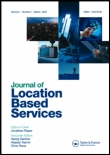
Journal of Location Based Services
Unveiling Trends in Location-Based ServicesJournal of Location Based Services, published by Taylor & Francis Ltd, is a pivotal platform for the dissemination of innovative research in the domains of Computer Networks, Electrical and Electronic Engineering, and Signal Processing. With an ISSN of 1748-9725 and an E-ISSN of 1748-9733, this journal has been a cornerstone for scholars since its inception in 2007 and is set to continue until at least 2024. Its impactful contributions have established it as a respected publication, holding a Q3 ranking in Computer Networks and Communications, a Q2 ranking in Electrical and Electronic Engineering, as well as a Q3 ranking in Signal Processing for the year 2023. The journal's Scopus ranks reflect its standing within the academic community, achieving notable percentiles in various engineering domains. Although not currently open access, it remains a vital reference for researchers, professionals, and students who are shaping the future of location-based technology and its applications.
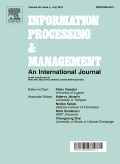
INFORMATION PROCESSING & MANAGEMENT
Exploring Innovative Methodologies for Information ExcellenceINFORMATION PROCESSING & MANAGEMENT, published by ELSEVIER SCI LTD, is a distinguished journal at the forefront of research in the fields of Computer Science, Information Systems, Library and Information Sciences, and Management Science and Operations Research. Since its inception in 1975, this journal has continually evolved to provide a scholarly platform for the dissemination of innovative methodologies and frameworks in information processing. With a remarkable Q1 ranking across multiple disciplines and esteemed Scopus rankings—notably, 1st in Media Technology and 4th in Library and Information Sciences—it stands as a pivotal resource for researchers, professionals, and students alike, seeking to advance their understanding and application of information management principles. Although not an Open Access journal, it remains widely accessed and respected, marking its influence in shaping the future of effective information management practices. The journal is committed to providing a rigorous peer-review process, ensuring the publication of high-quality research that addresses current challenges and trends in information technology and its application in various sectors.

BEHAVIOUR & INFORMATION TECHNOLOGY
Connecting Behavioral Science with Information Technology.BEHAVIOUR & INFORMATION TECHNOLOGY, published by Taylor & Francis Ltd, is a leading journal in the interdisciplinary field that bridges the gap between technology and human behavior. Established in 1982 and continuing through 2024, this journal has garnered a high reputation with impressive rankings in 2023 across various categories: Q1 in Arts and Humanities (miscellaneous), Q2 in Developmental and Educational Psychology, Q2 in Human-Computer Interaction, and Q1 in Social Sciences (miscellaneous). The journal's robust Scopus rankings point to its influence among peers, being placed in the top percentiles across multiple relevant disciplines. Although it does not offer open access, it remains a pivotal resource for researchers and practitioners interested in the dynamics of technology's impact on behavior. By publishing rigorously peer-reviewed research, BEHAVIOUR & INFORMATION TECHNOLOGY aims to foster insights that enhance our understanding of how information technology shapes human interactions and societal outcomes, making it a crucial publication for anyone engaged in this rapidly evolving field.

Information
Fostering collaboration in the realm of information science.Information is a distinguished open-access journal published by MDPI since 2010, dedicated to advancing the field of Information Systems. With its E-ISSN 2078-2489, the journal serves as a crucial platform for researchers, professionals, and students to disseminate and access innovative research and methodologies in the domain of information science, data management, and technology. Based in Basel, Switzerland, the journal has established a commendable reputation in the academic community, currently holding a Q2 ranking in the prestigious Scopus category of Information Systems, and occupies the 74th percentile among its peers. The breadth of the journal's objectives is to promote and facilitate the open exchange of ideas, research findings, and emerging trends, fostering collaboration and knowledge growth in a rapidly evolving digital landscape. With an unwavering commitment to high-quality scholarship and accessible knowledge, Information plays an essential role in shaping the future of the information sciences.